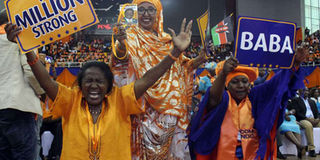Why one-term presidency is the answer to our leadership woes

Supporters of Nasa celebrate Raila Odinga's (not in picture) candidature at Safaricom indoor arena on May 5, 2017. He is the coalition's flag-bearer. The public commitment of Mr Raila Odinga to serve one term could be a game-changer. PHOTO | DENNIS ONSONGO | NATION MEDIA GROUP
What you need to know:
- Even though we have a good Constitution now, the regime has been effective at weakening institutions.
- But the big thing about elections, I argued, is that it is also about inclusion as opposed to exclusion of communities.
A friend of mine was back in Kenya recently, visiting after four years away.
He is an “Africa hand”, as they like to say and we sat and had a long talk as he was leaving. He had two questions for me.
First, what is it about elections in Kenya that people are so engaged, and candidates so keen on getting elected that they spend Sh29 million to get a party nomination?
After the new Constitution, he continued, surely politics should not be as crucial, now that there are “independent” institutions, and what fundamental difference can any candidate or party make to the lives of ordinary Kenyans?
UNPROGRESSIVE LEADERSHIP
His second question was harder. He had talked to all sorts of Kenyans, from taxi drivers, hawkers, business people, activists, religious leaders, traders and hotel workers.
All of them, without exception, and despite their ethnicity or status, complained bitterly about corruption with Eurobond, NYS and Mafya House scandals taking pride of place; that the “Singh’s” were gobbling up land and plots like there was no tomorrow; that the cost of living had doubled since 2013 with ugali now unattainable; that the extortionist police had not changed and were still a law unto themselves; that corruption had been devolved to the counties, despite the impressive gains from devolution; that government office and benefits seemed to benefit just two ethnic communities; and that there was serious intolerance to dissent and criticism of the regime.
Given all this mess, why is it that the regime still commands a significant following even as people know that it will certainly continue doing exactly the same if they come back to power?
Why was there not a massive shift to different leaders who had a 50-50 chance of changing Kenya?
OUR TURN TO EAT
I said that even though we have a good Constitution now, the regime has been effective at weakening institutions, and politicising some of them, because they preferred the old one, which gave total power to the Executive to ride roughshod over everyone and everything.
I said that one of the lessons from 2003, after the NARC victory, was that you cannot have reforms without reformers, and the easiest way to destroy, weaken or politicise supposedly independent institutions was to stack them with political hacks who do the bidding of the powerful either from fear or for profit.
Moreover, I said, we know that political power inevitably means monetary rewards, which is why people will spend millions on trying to get elected, knowing that they will illegally recoup their expenses, in a culture of our “turn to eat”.
This is why corruption is so difficult to eradicate, and until we get leaders willing to end this cycle, our anti-corruption rhetoric will remain just that.
ONE TERM
But the big thing about elections, I argued, is that it is also about inclusion as opposed to exclusion of communities.
Given the history of past regimes, and that every president benefited their own way more than others, politics is a zero-sum game where those in power take everything, leaving the other communities with crumbs.
It is for this reason that the public commitment of Mr Raila Odinga to serve one term could be a game-changer, especially if he keeps repeating it.
There have been previous secret promises to serve one term but these have always been broken, causing mistrust among politicians.
But Mr Odinga’s one term promise needs more.
Both Mr Kalonzo Musyoka and Mr Musalia Mudavadi should also repeatedly publicly state that they, too, would serve but one term, if they ascend to the presidency.
INCLUSIVITY
Not only would this bring hope to the many Kenyan communities that have felt excluded from the mainstream of national politics — and make Uhuruto look exclusionary with their intention to stay till 2032 — but it may be the beginning of the nation-state of Kenya where all feel they have a stake and a place, from the top to the bottom.
And remember, it is better to have a good leader for a short time, than a bad one for a long time, and perhaps freed from the pressures of seeking a second term, a one-term president may actually positively transform Kenya as they have nothing to lose!





